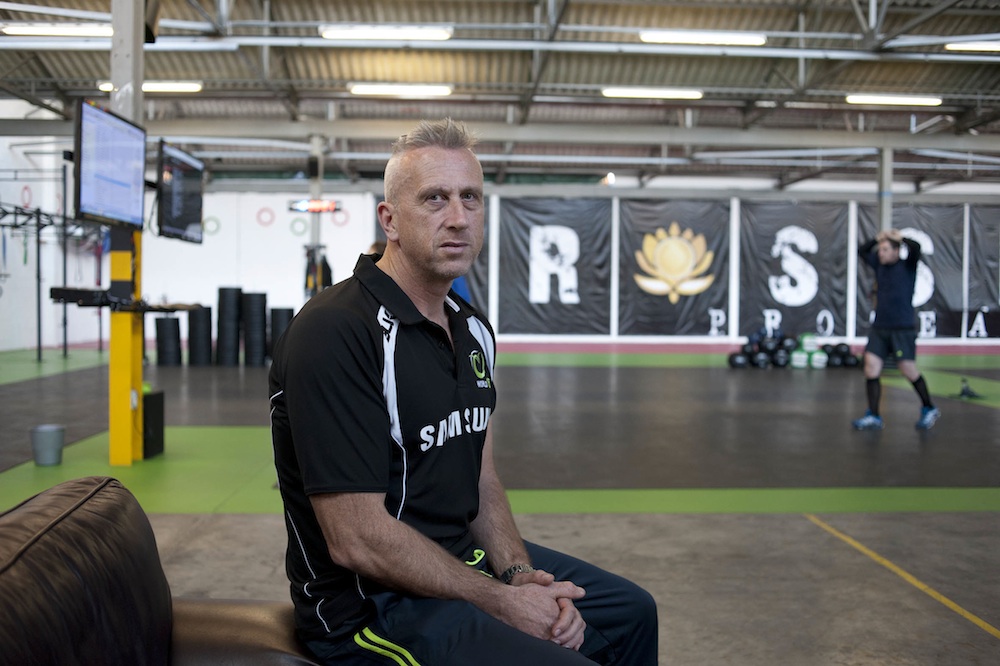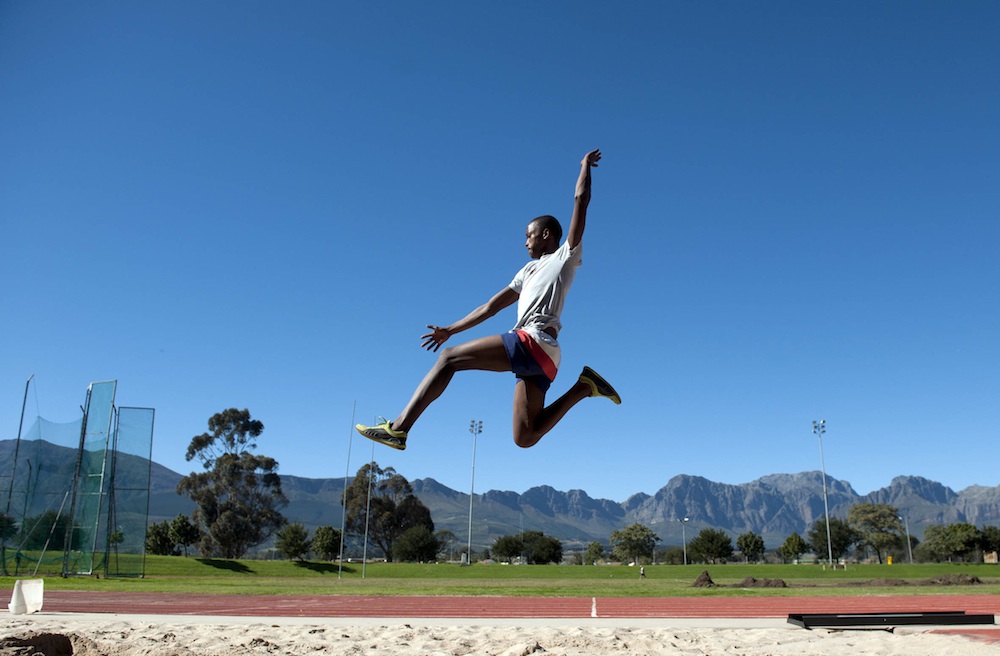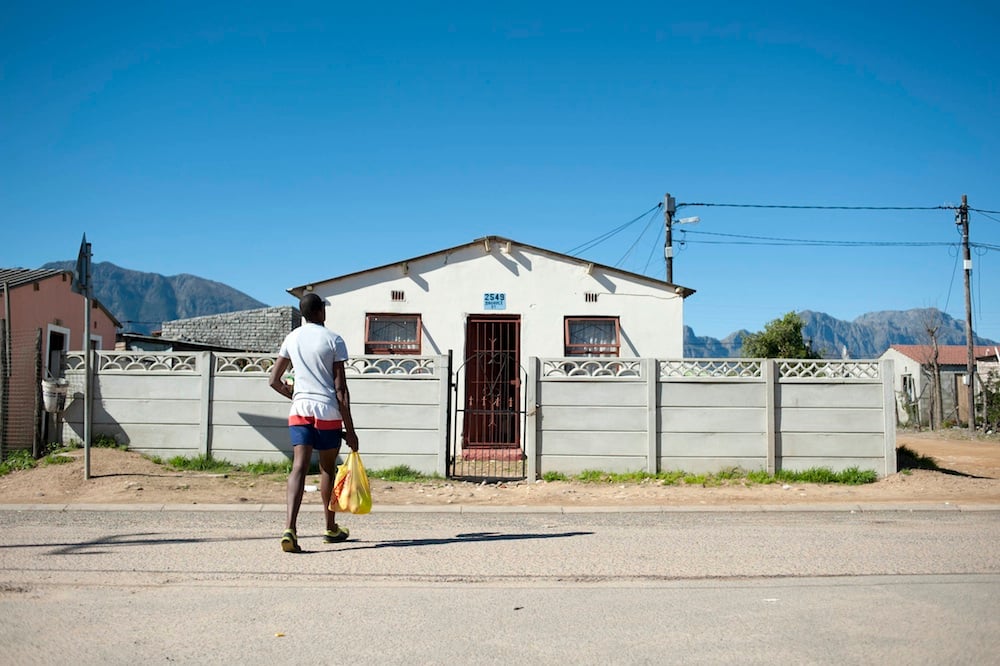When the wheels come off: Luvo Manyonga is mourning the death of his coach – and a lost opportunity in Glasgow.
Late on Monday morning, in the dignified surrounds of Stellenbosch University, there was a memorial service for Maties athletics coach Mario Smith. It was a select gathering in what they call “die saal” in Maties circles: an old, narrow hall with vases of flowers in the recessed windows and thick wooden beams in the ceiling.
The statue of Danie Craven and his dog Bliksem stood guard nearby and the air was cold with grief and pain. A boy sitting in front of me cried softly on his mother’s shoulder. Smith had been a feature of Stellenbosch athletics for years. He was wise and caring and the eulogies were long and heartfelt.
When Smith died of his wounds from a horrendous car accident at the end of June he was on his way to see one of his star athletes, Luvo Manyonga, a long jumper. Matters between Manyonga and Smith had soured in recent months and Smith was attempting to patch things up.
Just as Smith never got to Manyonga’s small house in the Phola Park section of Mbekweni township outside Paarl, so Manyonga didn’t attend Smith’s memorial on Monday. He intended to; he dressed for the occasion, in tight-fitting red jeans and black slip-on shoes with pointy toes, leaving the family’s five-roomed home with the intention of catching the train from Mbekweni station to Stellenbosch. He never made it.
He never made it because on the way he bumped into some mates, the street-corner habitués you see loitering everywhere in Mbekweni. One thing led to another and they smoked a tik pipe together. Stoned, immaculate, Manyonga missed his train.
One-in-a-million athlete
He speaks with ardour and precision about the preparation of tik, the elongation of the tube used to heat it and the creation of the bulb in which the crystal meth is placed. He should know, because he is addicted to the drug. He only speaks about one other thing with such focus and unbridled passion – and that’s long jumping. He should, because he’s a long-jumping sensation, the kind of one-in-a-million athlete who seems born to jump long and far.
You might infer Manyonga’s athletic prowess just by looking at him: he has long, thin legs and slim hips and walks with the casual, almost flighty grace of a supermodel. His step is so light that he seems to do no more than brush the earth on which he treads, floating rather than walking.
The experience of jumping is spiritual because the words he uses to describe it show clear signs of straining under their load. “It feels like you are somewhere not on this planet,” he says when I ask him to describe the exhilaration of jumping. “Like you are just in heaven.”
When Smith saw him at an athletics meeting for the first time four or five years ago, he is reputed to have said that Manyonga had the most perfect technique he had even seen.
It was Smith who submitted Manyonga’s papers to the South African Sports Confederation and Olympic Committee for Commonwealth Games qualification. But, in a bureaucratic muddle, some of the papers went missing and a certain sheet apparently never arrived.
The upshot of this was that Manyonga, who has already fallen foul of both the drug and athletics authorities, didn’t go to Glasgow as he should have.
The suspicion in his camp is that he was deemed to be a public relations liability. He has already served an 18-month suspension for testing positive for tik and the feeling was that it was expedient to pretend that he wasn’t there.

Long shot: Strength coach John McGrath stubbornly refuses to give up on the naturally talented Luvo Manyonga.
(David Harrison)
For all his scandalous talent – he won the long jump event at the World Junior Championships in Moncton, Canada, in 2010, and a year later was placed fifth in Daegu, South Korea, at the senior World Champs, without stretching himself unduly – Manyonga now has a bad reputation. People are beginning to tread warily around him.
But he is also crying out to be saved and, if he can’t do it himself, there are others prepared to do it for him. Recently he was adopted by John McGrath, an Irishman who was holidaying in South Africa in 2010 “and more or less never went home” because he fell in love with the Western Cape.
Conditioning consultant
Professionally, McGrath is a strength and conditioning coach but has rowed for Ireland and has also participated in the Coney Island strongman competitions, tearing phone directories in half and bending wrenches and iron bars.
He has acted as a conditioning consultant to the town’s two powerful first XVs, at rugby-mad schools Paarl Boys and Paarl Gym, and recently opened his own training area in a draughty warehouse in an industrial corner of town. He and his squat black Jeep are much-loved features of the landscape.
Several years ago, McGrath heard of Manyonga’s easy gifts and found the lure impossible to resist. “I was warned to stay away,” he says. “But that’s like giving an Irishman an invitation to do exactly the opposite.
“I took four or five trips into Mbekweni to look for him … Eventually I tracked him down.
“As far as I can tell, there are only two ways he can go: he’ll either be standing on an Olympic podium, or he’ll be dead from an overdose by the time he’s 30.”
Initially McGrath helped Manyonga with explosive work, strengthening his core and his thighs and helping him to increase the speed with which he approaches the plate before lifting off.
“I have travelled to 57 countries around the world for one thing or another,” he says, “and never, in 30 years, have I seen someone as straightforwardly gifted as Luvo.”

Long jumper Luvo Manyonga. (David Harrison)
But nothing has prepared him for the emotional challenges laid down by his protégé. There are times when Manyonga frays McGrath’s nerves horribly. He misses appointments, disappearing into the Mbekweni underworld for days. He appears to take trains that never arrive. On the day of our interview, we chased him for five hours.
First, he was meant to be in Stellenbosch for Smith’s memorial service; then we found out that he was at the Mbekweni Metrorail station; then he was spotted in Project 2. After that we bumped into his sister, Vuyiseka, who fancied he might be with friends in the township’s S block. After that we headed for Dube, passing Manyonga’s former school, Desmond Mpilo Tutu Secondary, as we went. Then it was on to the Mbekweni Sports Centre. He had been there, we were told. Was it an hour ago or two, we asked. No one seemed to know.
Eventually, almost by accident, we hooked up with Manyonga at the station. The situation had become hysterical and darkly comic a long time ago. When she saw him, Vuyiseka swore at him in isiXhosa.
Abandoned by authorities
Loving Luvo, then, is hardly an undertaking that promises great reward. McGrath admits as much, saying softly that he knows he’s taking “a punt”. He realises, too, that times like these are excruciating for the kid. He has just lost his coach, a decent man, and isn’t competing. His life is directionless and empty, as the authorities, only too happy to claim his achievements as their own when it suits them, have in effect abandoned him.
He owns neither a cellphone nor a pair of spikes, because both will disappear quicker than you can say “score”. He never completed matric because in 2010, his matric year, his career “was flying”, in the memorable words of his sister. There is vague talk of a job. McGrath seriously doubts he can hold one down.
“We now have no leverage,” admits the Irishman. “We have got negative equity. We wanted to knock on doors to see if we could find the money to put him in a proper rehab programme, but he hasn’t gone to Glasgow so he’s got no profile. Adidas won’t even give him a pair of spikes. His name has the opposite effect of what we desire.”
It is difficult to know where Manyonga’s gift comes from. His father, John, who spent some of his early working life upcountry on the platinum and gold mines before working as a fork-lift truck operator for 15 years, was never much of a presence in Manyonga’s life. But John did have some athletic and rugby talent, playing as a left wing for the Impala Platinum rugby teams where he worked.
His mum, Joyce, didn’t appear to bequeath him athletic prowess, although she did provide love and boundless tolerance and domestic stability. She is a domestic worker in Paarl and seems to be the one pole of strength around which the scandalously talented youngest of her three children orbits.

The gifted athlete’s mother, Joyce, provides him with his sole anchor from her home in Mbekweni.
(David Harrison)
Perhaps because of his age, 21, Manyonga says that the children of the township are his biggest fans. As a rule, the older members are fickle and jealous and he estimates that 80% of them are against him.
After finishing fifth in the World Championships three years ago, he brought back R80 000 in prize-money from South Korea, unheard-of riches for a family of their means. Friends started crawling out of the woodwork.
Hurdling over stationary cars
Despite it all, he has remained the children’s hero. They think, he says, that he can jump over a bus and often ask him to try. The best he has done so far is to hurdle over stationary cars: first a Volkswagen Polo and then a Renault Megane. He jumped over the Megane easily, with the sort of carefree elegance for which he is justly famous – he was wearing Crocs at the time.
Other than his tik addiction, Manyonga has one other small problem. He closes his eyes when he hits the board because he is petrified of heights. “I was in Finland competing the one time and all of us went out to a lake there to swim,” he says. “We were on a cliff, maybe five or six foot up, and everyone was jumping into the water. I am there, standing, saying: ‘Luvo, go, jump’, but my body doesn’t move. There I am standing. Everyone was waiting.”
Manyonga is in a similar position right now. There is a sense of people waiting to see which way he falls. McGrath, who has support from Ryk Neethling, the Olympic swimmer, wants to take him out of his community and put him in rehab so he can dry out before the summer and the start of the athletics season.
Manyonga, meanwhile, is wrestling with the disappointment of not going to Glasgow, the death of his coach and the temporary suspension of his dreams.
When McGrath talks about him, he talks of Hurricane, the song by Bob Dylan about the boxer Rubin Carter. In it he hears echoes of Manyonga’s story: a story of injustice and promise unfulfilled, the dark wings of tragedy hovering diligently in the shadows, just close enough to the action that they can be sensed.
When asked what he wants to achieve, Manyonga is matter-of-fact. “I want to be someone in life,” he says. “Not a hero or a millionaire. I want to be a normal person with a family, a person people look up to and say, ‘one day, I want to be just like him’.”